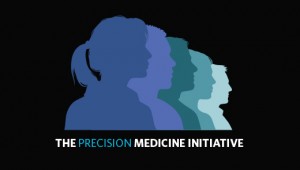First of all, it’s a big deal, high on President Obama’s agenda and with its own page on the White House Web Site
Near term goals
One immediate goal of the Precision Medicine Initiative will be to significantly expand efforts in cancer genomics to create prevention and treatment successes for more cancers.
But the long term goals are broader
the Initiative will 1) support a national network of scientists who possess the talent and skills to develop new approaches for answering critical scientific and medical questions and 2) launch a national cohort study of a million or more Americans to propel our understanding of health and disease. The goal is to set the foundation for a new way of doing research that fosters open, responsible data sharing with the highest regard to patient privacy, and that puts engaged participants at the center.
You’ll soon recognize the PMI logo
Some specific research questions would be to:
- Identify genomic variants that affect drug response
- Assess clinical validity of genomic variants associated with disease
- Identify biomarkers that are early indicators of disease
- Understand chronic diseases and best management strategies
- Understand genes/pathways/factors that protect from disease
In the process, we will learn about EHRs, mhealth, patient engagement and new research methodologies.
Transparency
Workshops conducted by the PMI Working Group are open to the public if space is available, and can be viewed on webcasts. The recent workshop on Participant Engagement and Health Equity (July 1 and 2, 2015) was phenomenal, and worthwhile catching the video.
